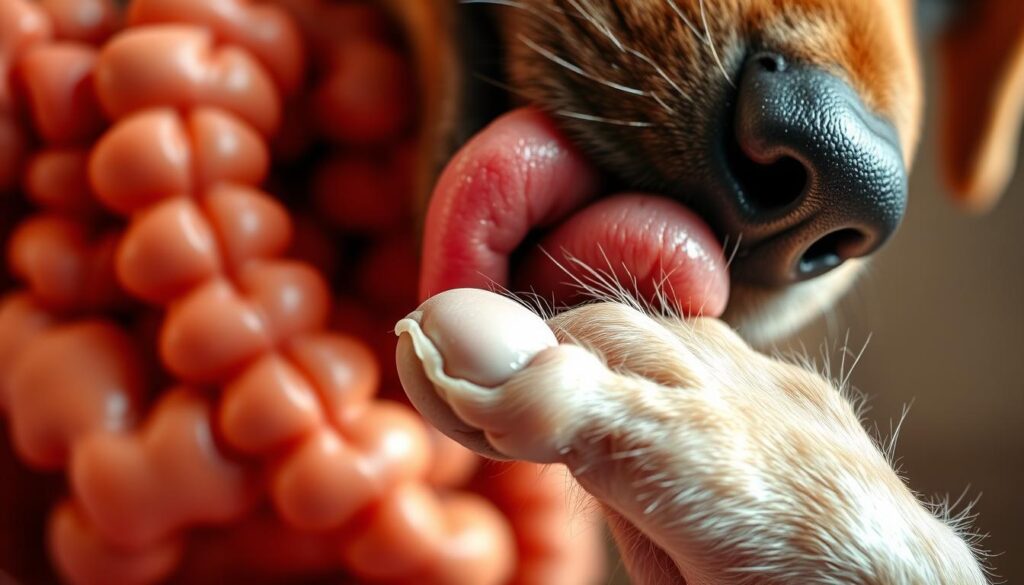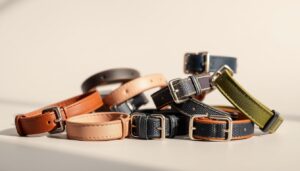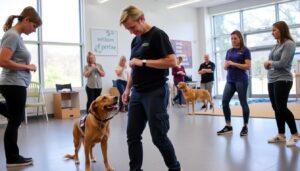If your dog constantly chews on its paws, it could indicate underlying issues, including digestive problems. Understanding the connection between gut health and dog paw chewing can help you address this behavior at its source. Improving your dog’s digestion can reduce or eliminate the paw-chewing habit, ensuring your pet’s overall well-being. This guide will explore how a healthy gut can lead to happier paws and healthier dogs.
Sometimes, paw licking can point to skin irritation, allergies, or even an underlying infection. But did you know that gut health plays a significant role, too? An imbalanced digestive system can lead to discomfort, which your pet may express through excessive licking. Gut Health and Dog Paw Chewing.

In this article, we’ll explore practical solutions to address this issue. From dietary adjustments to lifestyle changes, we’re here to help you create a healthier environment for your pet. Let’s uncover the secrets to a balanced gut and happier paws!
Key Takeaways: Gut Health and Dog Paw Chewing
- Occasional paw licking is normal, but excessive behavior may indicate a problem.
- Skin irritation, allergies, or infections can cause your pet to lick their paws.
- Gut health plays a crucial role in your pet’s overall well-being.
- Dietary changes and probiotics can help address the issue.
- Consulting a veterinarian is essential for persistent or severe cases.
Understanding Dog Paw Chewing and Its Causes
Have you noticed your furry friend focusing too much on their paws? While occasional grooming is regular, excessive attention to their paws can signal an underlying issue. Let’s explore the difference between healthy habits and behaviors that need attention.

Normal Self-Grooming vs. Overgrooming Behavior
It’s natural for pets to groom themselves. A quick lick here and there is part of their routine. However, when this behavior becomes constant, it could point to discomfort or even a health concern. Overgrooming can lead to skin irritation, redness, or even infections.
Environmental and Behavioral Triggers
Sometimes, external factors play a role. Allergens like pollen or harsh surfaces can irritate your pet’s paws, causing them to lick excessively. Behavioral triggers, such as stress or anxiety, can also lead to this habit. Understanding these causes is the first step toward finding a solution.
We’re here to help you identify the reason behind your pet’s behavior. By recognizing early signs and maintaining regular grooming, you can ensure your companion stays happy and healthy. Consulting a veterinarian is always a great idea!
Exploring the Gut Connection to Canine Paw Chewing
Your pet’s paw licking could be a sign of an internal imbalance. While it might seem like a simple grooming habit, excessive licking often points to deeper issues. One of the most fascinating connections is the gut-brain-skin axis, which links digestive health to skin and behavior.

The Gut-Brain-Skin Axis in Dogs
Recent studies show that the gut, brain, and skin are closely connected. When your pet’s digestive system is out of balance, it can lead to skin irritation and discomfort. This imbalance often manifests as excessive paw licking or chewing. The gut-brain-skin axis explains how stress, diet, and harmful bacteria can all play a role.
How Digestive Health Influences Skin Irritation
A healthy gut is essential for your pet’s overall well-being. When harmful bacteria overgrow, it can cause inflammation, leading to itching and irritation. This discomfort often drives pets to lick their paws excessively. By improving digestive health through a balanced diet and probiotics, you can help reduce these symptoms and promote a happier, healthier pet.
We’re here to guide you through holistic approaches to pet care. Understanding the gut-brain-skin connection is the first step toward addressing your pet’s needs. Let’s work together to create a healthier environment for your furry friend!
Dog Chewing Paws Gut Health: Understanding the Connection
Is your furry companion constantly focusing on their paws? While it might seem harmless, excessive licking can point to deeper issues. One of the most significant factors is an imbalanced gut microbiome. Let’s explore how this connection works and what you can do to help.
The Impact of an Imbalanced Gut Microbiome
Your pet’s digestive system plays a vital role in its overall well-being. When the gut microbiome is out of balance, it can weaken the pet’s natural defenses. Harmful bacteria may overgrow, leading to inflammation and discomfort. This imbalance often manifests as skin irritation, triggering excessive paw licking.
Linking Inflammation to Excessive Paw Licking
Inflammation caused by gut imbalances can spread to the skin, causing itching and irritation. Your pet may lick their paws excessively to soothe the discomfort. Research shows that maintaining a healthy gut can reduce these symptoms and improve their quality of life.
We’re here to guide you through this process! You can support your pet’s digestive health by focusing on a balanced diet and incorporating probiotics. If symptoms persist, consulting a veterinarian is always the best step. Together, we can ensure your furry friend stays happy and healthy!
Uncovering Common Allergens and Secondary Causes
Is your furry friend constantly licking their paws? While it might seem harmless, this behavior can indicate underlying issues. Understanding the triggers is the first step toward providing relief and ensuring their well-being.
Food and Environmental Allergies,, Gut Health, and Dog Paw Chewing
Allergies are a common cause of paw licking. Food allergens like beef, chicken, or grains can irritate your pet’s system. Environmental triggers such as pollen, dust, or mold can also lead to discomfort. Identifying these allergens can help you make necessary dietary or environmental changes.
For example, switching to a hypoallergenic diet or using air purifiers can reduce exposure. Regular grooming and wiping their paws after outdoor activities can also minimize irritation. If you suspect allergies, consulting a veterinarian for testing is a great step.
Easiest Dogs to Potty Train: The Top Breeds for Hassle-Free Housebreaking
Parasites, Infections, and Injuries, Gut Health and Dog Paw Chewing
Parasites like fleas or ticks can cause intense itching, leading to excessive licking. Infections, whether bacterial or fungal, can also irritate the skin. Minor injuries such as cuts or nail issues can exacerbate the behavior.
Preventative measures like flea treatments and regular paw inspections can help. If you notice redness, swelling, or persistent licking, it’s time to visit the vet. Early intervention can prevent complications and ensure your pet stays comfortable.
We’re here to help you navigate these challenges! By understanding these triggers, you can take proactive steps to keep your furry friend happy and healthy. Remember, a little care goes a long way!
Effective Dietary Strategies and Probiotics
Are you looking for ways to support your pet’s well-being through diet? A balanced, high-quality diet can make a world of difference in addressing their needs. Let’s explore how the right food and supplements can promote a healthier, happier life for your furry friend.
High-Quality Diet for a Healthy Gut
Feeding your pet a nutritious diet is one of the best ways to support their digestive system. Foods rich in dietary fiber and lean proteins help maintain a healthy balance of gut bacteria. This balance is essential for reducing discomfort and improving overall health.
Consider incorporating products like Belly Buddies, which are designed to support digestive health. A well-rounded diet not only boosts their energy but also strengthens their natural defenses against common issues.
The Role of Probiotics and Supplements
Probiotics are a game-changer for your pet’s digestive system. These beneficial bacteria help reduce inflammation and improve gut health, which can alleviate skin irritation and excessive licking. Supplements like these are easy to add to their daily routine and can have a lasting impact.
When choosing supplements, look for high-quality options with proven benefits. Always consult your veterinarian to ensure the products are safe and suitable for your pet’s specific needs.
We’re here to guide you every step of the way! By focusing on a balanced diet and incorporating probiotics, you can help your pet feel their best. If you’re unsure where to start, a veterinarian or nutritionist can provide personalized recommendations. Together, we can create a healthier, happier life for your furry companion!
Behavioral and Environmental Solutions for Relief
Are you searching for ways to help your pet feel more comfortable and relaxed? Addressing their needs through simple adjustments can make a big difference. Let’s explore how you can create a calmer environment and provide practical care to reduce discomfort.
Stress Reduction and Mental Stimulation
Stress can often lead to unwanted behaviors like excessive licking. Regular exercise is a great way to help your pet release pent-up energy. Activities like walks, fetch, or agility training can keep them active and happy.
Mental stimulation is just as important! Puzzle toys, treat-dispensing games, and training sessions can keep their mind engaged. This reduces boredom-related behaviors and promotes a sense of calm.
Practical Paw Care and Preventative Tips Gut Health and Dog Paw Chewing
Taking care of your pet’s paws is essential for their comfort. After walks, gently clean their paws to remove dirt, allergens, or irritants. Moisturizing balms can help prevent dryness and cracking, especially in harsh weather.
Consider using protective booties during outdoor activities. These can shield their paws from rough surfaces or extreme temperatures. Regular nail trims are also crucial to avoid discomfort or injuries.
Creating a calm environment at home can further support their well-being. Soft bedding, soothing music, and a consistent routine can help reduce stress and promote relaxation.
We’re here to guide you every step of the way! Small changes in your pet’s routine can lead to big improvements in their comfort and happiness. If you’re ever unsure, consulting a veterinarian is always a great idea!
Conclusion
Caring for your furry friend’s well-being involves understanding their habits and needs. While occasional licking is normal, persistent issues may signal deeper concerns. Addressing gut health, dietary adjustments, and proper stress management can make a significant difference.
We’re here to guide you every step of the way! By focusing on a balanced approach, you can help your pet feel their best. Remember, consulting a veterinarian ensures personalized advice tailored to their unique needs.
Together, we can create a happier, healthier environment for your companion. Thank you for being a proactive pet parent—support is always available when you need it!
FAQ
Why does my pet lick their paw excessively Gut Health and Dog Paw Chewing?
Excessive paw licking can be caused by allergies, infections, or even stress. It’s often a sign of discomfort or irritation, so it’s best to consult your vet to pinpoint the exact reason.
Can diet affect my pet’s paw licking behavior Gut Health and Dog Paw Chewing?
Absolutely! A poor diet can lead to an imbalanced gut microbiome, which may trigger inflammation and itching. Switching to high-quality food or adding probiotics can help improve their overall health.
Are there environmental factors that cause paw licking?
Yes, environmental allergens like pollen, dust, or even flea bites can cause irritation. Keeping their living space clean and using hypoallergenic products can reduce this issue.
How do I know if my pet’s paw licking is serious?
If you notice redness, swelling, or a foul odor, it could indicate an infection or injury. Persistent licking is a symptom that shouldn’t be ignored—schedule a visit with your veterinarian.
Can stress cause my pet to lick their paws?
Yes, stress or anxiety can lead to excessive licking as a coping mechanism. Providing mental stimulation and a calm environment can help alleviate this behavior.
What role do probiotics play in paw health?
Probiotics support a healthy gut, which can reduce inflammation and skin irritation. Adding a trusted supplement to their diet may help address the root cause of paw licking.
How can I prevent my pet from licking their paws?
Regular paw care, like trimming nails and cleaning between pads, can help. Additionally, addressing underlying issues like allergies or stress is key to stopping the behavior.





Pingback: Best Diamond Care Urinary Cat Care Dry Cat Food - The Pet Advisor
Pingback: Discover the Cat Food with Coconut Oil Benefits. - The Pet Advisor